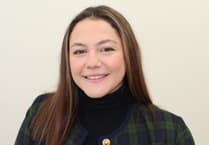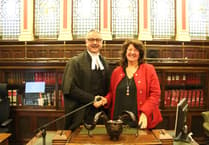A new attempt to impose greater restrictions on proposed abortion reforms has come under fire.
Bishop Peter Eagles plans to table amendments to the Abortion Reform Bill, including shorter time limits - despite a similar move being defeated in the House of Keys - and impose restrictions on when women would be allowed to obtain and use an abortion pill.
He will make his move in the Legislative Council today (Tuesday), when the bill is scheduled for a second reading and detailed scrutiny of its clauses.
But Campaign for Abortion Law Modernisation spokeswoman Stephane Kelsey said: ’We can only trust that the other MLCs will see these amendments for what they are: cynical repeats of previous, failed attempts to restrict the scope of the Abortion Reform Bill.’
The bill as it stands will allow abortion upon request up to 14 weeks, and for prescribed reasons - including health, serious social concern and serious impairment - in the 15-24-week period, as well as set out the very restricted circumstances in which it could take place after 24 weeks.
However, the Bishop - who voted in favour of the bill being granted a first reading last month - wants to change those times so abortion upon request would be up to 12 weeks and for the prescribed reasons between 13 to 22 weeks.
Supporters of the bill argue the debate on timescales has already taken place in the House of Keys, with attempts to reduce the times defeated.
The Bishop will also seek to remove one of the provisions that would permit late abortions when there was a substantial risk that, if the child were born alive, it would ’suffer a serious impairment which is likely to limit both the length and quality of the child’s life’.
Once more, this would go against the decision taken in the House of Keys.
He also has amendments governing the use of abortion pills. He wants to see a pharmacist, midwife or nurse require the consent of a registered medical practitioner to prescribe or supply products to procure an abortion.
On top of that, he wants a provision that whoever supplies the produce ensures that it is taken by the woman ’only in the presence of a relevant professional or pharmacist’.
In the UK the current practice is for women to have the first set of pills in a clinic or hospital, but then have to return 24 hours later to take the second course of medication.
Those seeking a more relaxed regime argue this can mean women miscarry on their way home,
The Royal College of Obstetricians and Gynaecologists has campaigned for women to be allowed to administer their own medication at home under professional guidance and with telephone support available.
Scotland has legislated for women to be able to take their second course of tablets at home and Wales may follow.
While it remains to be seen whether the Bishop will even obtain a seconder to some of his amendments, it re-opens the debate about his political role.
Although Bill Henderson MLC, in charge of guiding the bill through the Legislative Council, has already said he welcomes the Bishop’s input into the debate, several MHKs have previously raised concerns about the Bishop being a voting member of Tynwald and Legislative Council, no matter what the issue.
They are unlikely to be impressed to see him table anything other than technical amendments to legislation that has been approved by the House of Keys.
Given the recent, clear signs of antagonism between the upper chamber - appointed by the House of Keys - and some MHKs, it is likely to stoke the fire once more, just weeks after Chief Minister Howard Quayle lectured new MLCs about their role.
Ms Kelsey said: ’Although the vast majority of amendments tabled by members of the Legislative Council are minor technical ones, a total of eight have been tabled by the Lord Bishop - every single one of which is a change to clauses which have already been debated at length by MHKs.
’CALM sees this as no less than an attempt to delay the passage of the bill and to ignore the will of the House of Keys, by an appointed, not elected, MLC.’
She added: ’Every day this bill is delayed is a day when a real person needs abortion services which could be provided safely and legally here in the island.
’By tabling these amendments now, the Lord Bishop is ignoring the fact that women will require these services and will travel to another jurisdiction, or risk prosecution by buying illegal pills, whether he likes it or not.’
Attorney General John Quinn also has many amendments tabled .
As previously signalled, the definition of ’health’ at the start of the bill is set to be removed. It has caused much debate and concern over ’legislative issues’, as acknowledged by Mr Henderson at the first reading, but there is a general feeling it may be superfluous anyway.
Mr Quinn will also seek to change some of the wording for the provisions to create access zones around medical centres, to protect women from harassment, to ensure they are robust against any challenges under human rights laws.
Meanwhile, Dr Alex Allinson (Ramsey), who guided the bill through the House of Keys, may be called to give evidence to the upper chamber, if required.




